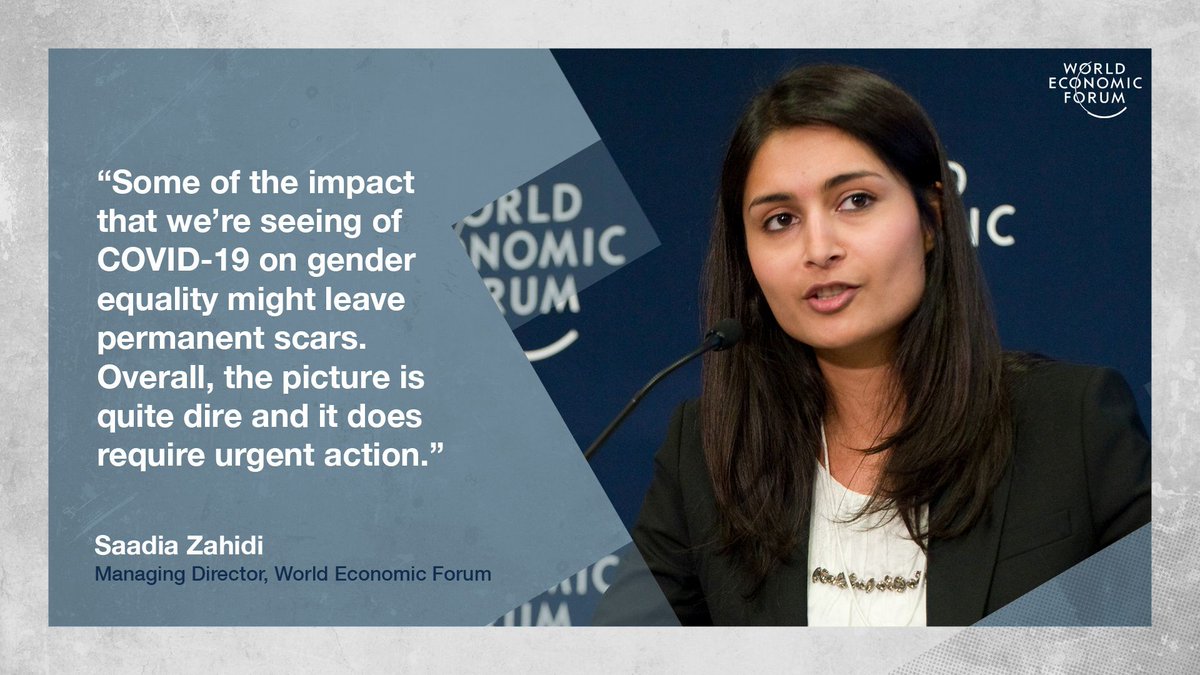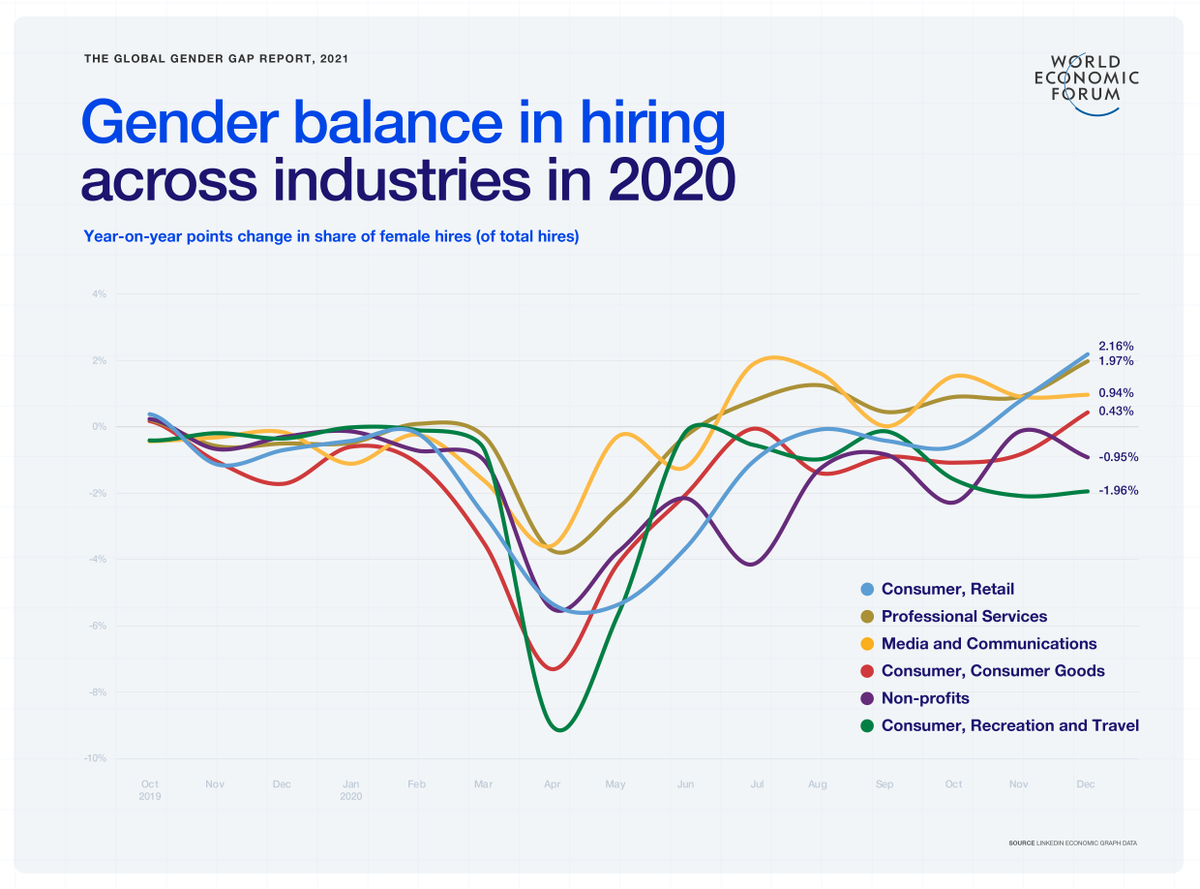Another generation of women will have to wait for gender parity, according to the World Economic Forum Global Gender Gap Report 2021. As the impact of the COVID-19 pandemic continues to be felt, closing the global gender gap has increased by a generation from 99.5 years to 135.6 years.
The COVID-19 pandemic has raised new barriers to building inclusive and prosperous economies and societies. Pre-existing gender gaps have amplified the crisis asymmetrically between men and women, even as women have been at the frontlines of managing the crisis as essential workers. The hardest hit sectors by lockdowns and rapid digitalization are those where women are more frequently employed. Combined with the additional pressures of providing care in the home, the crisis has halted progress toward gender parity in several economies and industries.
The Global Gender Gap Index benchmarks the evolution of gender-based gaps among four key dimensions (Economic Participation and Opportunity, Educational Attainment, Health and Survival, and Political Empowerment) and tracks progress towards closing these gaps over time.
This year, the Global Gender Gap index benchmarks 156 countries, providing a tool for cross-country comparison and to prioritize the most effective policies needed to close gender gaps. The methodology of the index has remained stable since its original conception in 2006, providing a basis for robust cross-country and time-series analysis. The Global Gender Gap Index measures scores on a 0 to 100 scale and scores can be interpreted as the distance to parity (i.e. the percentage of the gender gap that has been closed).
The 14th edition of the report, the Global Gender Gap Report 2020, was launched in December 2019, using the latest available data at the time. The 15th edition, the Global Gender Gap Report 2021, comes out a little over one year after COVID-19 was officially declared a pandemic. Preliminary evidence suggests that the health emergency and the related economic downturn have impacted women more severely than men, partially re-opening gaps that had already been closed.

Global Trends and Outcomes
Globally, the average distance completed to parity is at 68%, a step back compared to 2020 (-0.6 percentage points). These figures are mainly driven by a decline in the performance of large countries. On its current trajectory, it will now take 135.6 years to close the gender gap worldwide.
The gender gap in Political Empowerment remains the largest of the four gaps tracked, with only 22% closed to date, having further widened since the 2020 edition of the report by 2.4 percentage points. Across the 156 countries covered by the index, women represent only 26.1% of some 35,500 parliament seats and just 22.6% of over 3,400 ministers worldwide. In 81 countries, there has never been a woman head of state, as of 15th January 2021. At the current rate of progress, the World Economic Forum estimates that it will take 145.5 years to attain gender parity in politics.
Widening gender gaps in Political Participation have been driven by negative trends in some large countries which have counterbalanced progress in another 98 smaller countries. Globally, since the previous edition of the report, there are more women in parliaments, and two countries have elected their first female prime minister (Togo in 2020 and Belgium in 2019).
The gender gap in Economic Participation and Opportunity remains the second-largest of the four key gaps tracked by the index. According to this year’s index results 58% of this gap has been closed so far. The gap has seen marginal improvement since the 2020 edition of the report and as a result we estimate that it will take another 267.6 years to close.
The slow progress seen in closing the Economic Participation and Opportunity gap is the result of two opposing trends. On one hand, the proportion of women among skilled professionals continues to increase, as does progress towards wage equality, albeit at a slower pace. On the other hand, overall income disparities are still only part-way towards being bridged and there is a persistent lack of women in leadership positions, with women representing just 27% of all manager positions. Additionally, the data available for the 2021 edition of the report does not yet fully reflect the impact of the pandemic. Projections for a select number of countries show that gender gaps in labour force participation are wider since the outbreak of the pandemic. Globally, the economic gender gap may thus be between 1% and 4% wider than reported.

Gender gaps in Educational Attainment and Health and Survival are nearly closed. In Educational Attainment, 95% of this gender gap has been closed globally, with 37 countries already at parity. However, the ‘last mile’ of progress is proceeding slowly. The index estimates that on its current trajectory, it will take another 14.2 years to completely close this gap. In Health and Survival, 96% of this gender gap has been closed, registering a marginal decline since last year (not due to COVID-19), and the time to close this gap remains undefined. For both education and health, while progress is higher than for economy and politics in the global data, there are important future implications of disruptions due to the pandemic, as well as continued variations in quality across income, geography, race and ethnicity.
Access the full report.
Many employers are actively working to help close the gender gap.
Learn more about these employers and hear from the women working there.
Find out more
Disclosure: Where Women Work researches and publishes insightful evidence about how its paid member organizations support women's equality.